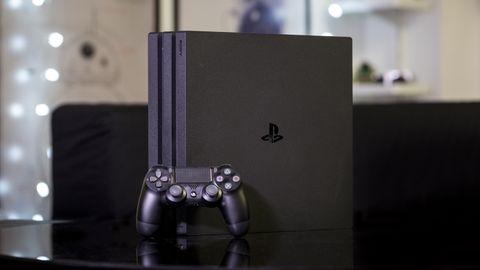TechRadar Verdict
Five after its launch, the PS4 Pro is still an easy buy for newcomers to the world of PlayStation and 4K HDR TV owners but it's increasingly hard to find. For most, the new PS5 is likely to be the most sensible option for future-proofing.
Pros
- +
First 4K HDR Sony console
- +
Larger 1TB hard drive
- +
The best Pro Mode games look great
Cons
- -
No 4K Blu-ray player
- -
Pro Mode support varies
Why you can trust TechRadar
The PS4 Pro was Sony’s most powerful console before the launch of the PS5, but even then, it doesn’t take away from the fact the Pro is still a significant bit of gaming kit. Its slick design and 4K capabilities mean it still performs incredibly well, even when compared to its next-gen equivalent.
Now that the PS4 Pro has been discontinued finding a brand-new one may pose a challenge. Luckily, a pre-owned one isn’t out of the question, and there’s always a chance you may find a decent standard PS4 bundle, but if you’re looking for the latest specs and gaming experience, looking for PS5 bundles may be a better alternative than just a PS4 pro.
Our review of the PlayStation 4 Pro below details everything you need to know about Sony’s 2016 mid-generation upgrade. We've covered the specs, outlined the capabilities and listed some of the games that are great to play. There are other important things to mention too, like whether you should grab a PSVR headset to go along with the PS4 Pro.
The PS4 Pro has the same impressive back catalogue of titles as the standard PS4. The titles released for the PS4 Pro will continue to work on the original console (as well as the PS4 Slim). While the PS Now service is now defunct, you can still get a wide library of games with a PS Plus Extra or PS Plus Premium subscription.
The big question is: should I get a PS4 Pro? That largely depends on what kind of TV you own, and what kind of console you have at the moment. If you don't yet have a PS4 console, then the PS4 Pro gives you 4K capabilities (on some titles) and extra power over the PS4 Slim, in return for paying a bit more money.
You should also note that Sony's PS4 Pro system has a few deficiencies in the home entertainment department: particularly in not having an Ultra HD Blu-ray player installed. If that's important to you, you might need to look elsewhere. Keep reading for our full review of the PS4 Pro.
PS4 Pro: FAQ
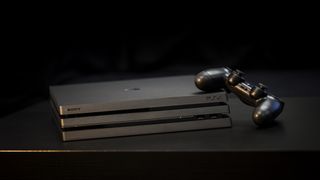
What’s the difference between the PS4 and the PS4 Pro?
On one hand, there’s isn’t much difference. Both consoles allow you to play the same games, use the same peripherals, and give you access to the same PlayStation Store – but when it comes to the look and feel of the games you play, you're getting a completely different experience.
The PS4 Pro is Sony’s more premium PS4 console. It plays games in a higher resolution (4K) and often in High Dynamic Range (HDR). It's a little more expensive than the regular PS4 was, but that's because it uses slightly different hardware to get better results in terms of performance. Check out our guide to the main differences between the PS4 Pro vs PS4 for more.
Is the PS4 Pro true 4K?
Yes, but games will need to receive a PS4 Pro patch to enable these more detailed resolutions. We only point that last part out because it's up to game developers themselves to issue those patches and ultimately utilize the more powerful hardware. No PS4 Pro mode, no PS4 Pro performance.
Now, it's worth noting that should you want to see what games in 4K HDR look like, you're going to need a 4K HDR TV - your old 1080p screen probably won't see a benefit outside of a few extra frames.
Is it worth buying a PS4 Pro without a 4K TV?
That depends. Without a 4K TV, you won’t be able to take advantage of the superior viewing offered up by the PS4 Pro. But the Pro does offer plenty of other benefits for those with 1080p screens. For example, many of the games with Pro patches do boast a sharper image while many also run at higher frame rates compared to the standard PS4.
What games are native 4K on PS4 Pro?
Loads of games run 4K natively on the PS4, including Red Dead Redemption 2, Marvel’s Spider-Man and No Man’s Sky. You can check out our full guide to the best PS4 Pro games to see them all.
PS4 Pro: design
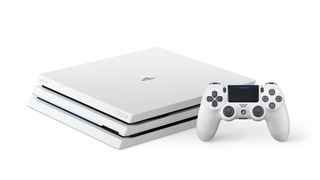
- Slightly bigger than standard PS4
- Additional 3.1 USB port on the rear
- Upgraded Wi-Fi and Bluetooth
We wouldn't say the PS4 Pro's design is a complete copy of the original PS4's, there are a lot of similarities – the first being the decision to keep the console a flat parallelogram.
When Sony first unveiled the PS4 Pro, there were jokes that the system felt like two PS4s stacked on top of one another, but the second you pull the system from the box that observation becomes less of a joke and more a fair observation.
Compared to the original PS4's 27.5 x 30 x 5.3 cm package, the PS4 Pro takes up a bit more shelf space at 29.5 x 32.7 x 5.5 cm (W x L x H). It's both a little wider and a little taller than the original PS4, and a fair bit heavier, too (though unless you carry your console around a lot, that's unlikely to matter).
The system is encased in a matte black shell, similar to the one used on the PS4 Slim released in September 2016. However, this time around you won't find rounded corners along the edges – the PlayStation 4 Pro is sharp in every sense of the word.

Another design difference is the silver PlayStation logo that sits in the center of the top surface, adding a nice touch of elegance. The PS4 Pro also uses a bulkier female connector on its power cable to draw more power, instead of the generic two-prong cable Sony has traditionally supplied with every PS4.
On the front of the console, you might notice that there are no touch-capacitive buttons: Sony has decided to ditch the accident-prone pads for more traditional plastic buttons, but they do the job just the same.
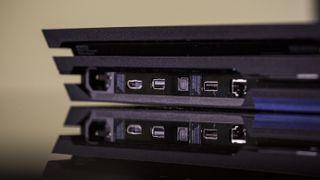
Next, let's talk inputs and outputs. You've got two Superspeed USB 3.1 ports on the front of the PS4 Pro and one on the back, used for syncing and charging controllers, as well as connecting your brand new PlayStation VR, should you buy one. HDMI 2.0a, Ethernet, optical audio and PlayStation Camera ports line up along the back next to the power connector.
You won't find an HDMI input port here like you would on the Xbox One, but Sony's workaround to its cable conundrum, PlayStation Vue, is an arguably effective one.
One final point here: while the exterior is nice, Sony has spent more time working on the inside of the console. Inside is a larger 1TB hard drive, which is 500GB more than you'll find on the original PS4 or the base model of the PS4 Slim. There's also an improved Wi-Fi antenna that uses dual-band 802.11ac wireless and Bluetooth 4.0 instead of 802.11 b/g/n and Bluetooth 2.1.
While the swapping out of a Wi-Fi antenna may not seem like a big deal, it helps the PS4 Pro download games faster: a 160MB game (Pac-Man 256) downloaded in under a minute on a 15Mbps connection, something that should have always been the case but wasn't on the original PS4.
PS4 Pro: controller
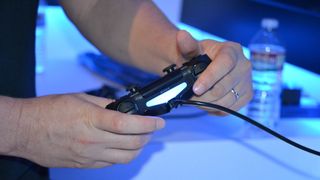
- Minor changes made
- Can be used in wired or wireless modes
- Light bar added to the front
A new system needs a new PS4 controller, and Sony obliges here – the controller that ships with the new PS4 Pro is the same one that will also ship with all PlayStation 4 Slim systems going forward.
It is, essentially, a very small iteration on the DualShock 4 controller you've probably been using for years. There's now a light bar built into the touchpad – a nice feature when you don’t want to turn the controller over in your hand to find out what player you are – but more importantly the triggers have been tweaked and it feels a bit lighter in the hand.
Plus, as we pointed out in the PlayStation 4 Slim review, the controller can also switch seamlessly between Bluetooth and wired mode when it's connected to the system via USB cable. While that might not sound like a huge addition, for a pro gamer it can mean the difference between a win (and a pot of esports prize money) or a loss.
Nick Pino is Managing Editor, TV and AV for TechRadar's sister site, Tom's Guide. Previously, he was the Senior Editor of Home Entertainment at TechRadar, covering TVs, headphones, speakers, video games, VR and streaming devices. He's also written for GamesRadar+, Official Xbox Magazine, PC Gamer and other outlets over the last decade, and he has a degree in computer science he's not using if anyone wants it.
